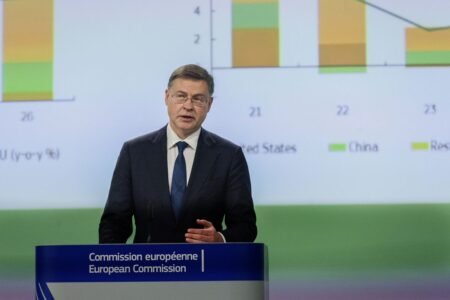(BRUSSELS) – Europe’s economy will experience a deep recession this year due to the coronavirus pandemic, according to the European Union’s summer economic forecast, published Tuesday by the EU Commission.
Because lifting of lockdown measures is proceeding more gradually than assumed in the Commission’s Spring Forecast, the impact on economic activity in 2020 will be more significant than anticipated.
The Summer 2020 Economic Forecast projects that the euro area economy will contract by 8.7% in 2020 and grow by 6.1% in 2021. The EU economy is forecast to contract by 8.3% in 2020 and grow by 5.8% in 2021. The contraction in 2020 is, therefore, projected to be significantly greater than the 7.7% projected for the euro area and 7.4% for the EU as a whole in the Spring Forecast. Growth in 2021 will also be slightly less robust than projected in the spring.
“Coronavirus has now claimed the lives of more than half a million people worldwide, a number still rising by the day – in some parts of the world at an alarming rate. And this forecast shows the devastating economic effects of that pandemic.” said the EU’s Commissioner for the Economy Paolo Gentiloni: “The policy response across Europe has helped to cushion the blow for our citizens, yet this remains a story of increasing divergence, inequality and insecurity.”
Mr Gentiloni urged swift agreement on the Commission’s proposed recovery plan, “to inject both new confidence and new financing into our economies at this critical time.”
Economic activity in the first quarter was already considerable, even though most EU Member States only began introducing lockdown measures in mid-March. With a far longer period of disruption and lockdown taking place in the second quarter of 2020, economic output is expected to have contracted significantly more than in the first quarter.
However, early data for May and June suggest that the worst may have passed. The recovery is expected to gain traction in the second half of the year, albeit remaining incomplete and uneven across Member States.
The shock to the EU economy is symmetric in that the pandemic has hit all Member States. However, both the drop in output in 2020 and the strength of the rebound in 2021 are set to differ markedly. The differences in the scale of the impact of the pandemic and the strength of recoveries across Member States are now forecast to be still more pronounced than expected in the Spring Forecast.
On inflation, the overall outlook for inflation has changed, although there have been significant changes to the underlying forces driving prices.
While oil and food prices have risen more than expected, their effect is expected to be balanced by the weaker economic outlook and the effect of VAT reductions and other measures taken in some Member States.
Inflation in the euro area, as measured by the Harmonised Index of Consumer Prices (HICP), is now forecast at 0.3% in 2020 and 1.1% in 2021. For the EU, inflation is forecast at 0.6% in 2020 and 1.3% in 2021.
The report issues a warning of “exceptionally high risks”, mainly to the downside.
The scale and duration of the pandemic, and of possibly necessary future lockdown measures, remain essentially unknown. The forecast assumes that lockdown measures will continue to ease and there will not be a ‘second wave’ of infections. There are considerable risks that the labour market could suffer more long-term scars than expected and that liquidity difficulties could turn into solvency problems for many companies. There are risks to the stability of financial markets and a danger that Member States may fail to sufficiently coordinate national policy responses. A failure to secure an agreement on the future trading relationship between the UK and the EU could also result in lower growth, particularly for the UK. More broadly, protectionist policies and an excessive turning away from global production chains could also negatively affect trade and the global economy.
There are also upside risks, such as an early availability of a vaccine against the coronavirus.
The Commission makes clear that its proposal for a recovery plan, centred on a new instrument, NextGenerationEU, is not factored into this forecast since it has yet to be agreed. An agreement on its proposal is therefore also considered an upside risk.
More generally, a swifter-than-expected rebound cannot be excluded, particularly if the epidemiological situation allows a faster lifting of remaining restrictions than assumed.
Regarding the UK, given that future EU-UK relations are not yet clear, projections for 2021 are based on a purely technical assumption of status quo in terms of their trading relations. This is for forecasting purposes only and reflects no anticipation nor prediction as regards the outcome of the negotiations between the EU and the UK on their future relationship.








